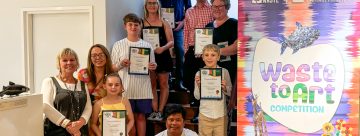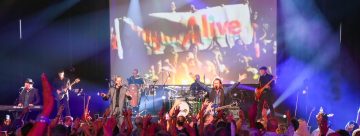 November 11 this year marks the 100th anniversary of the end of the First World War but one of the least known aspects of the war is that a total of 121 men serving in Australian military forces were sentenced to death during the conflict, many of them just country lads who had volunteered for service without really knowing what they were letting themselves in for. Not one of these men was actually executed but a powerful new novel by a Queensland author brings the brutal system of British battlefield ‘justice’ sharply into focus. A Dawn with no Birdsong by Tony Matthews delves deeply into one of the most controversial aspects of the First World War — the policy of the British military in executing its own men, and those of its allied forces, for misdemeanors such as sleeping at a post, shell-shock, striking an officer, and other similar ‘crimes’. ‘The injustice involved in almost all these cases is something which has always been of keen interest to me,’ Tony said recently, ‘the courage, resilience and suffering of those very ordinary men who volunteered, or were conscripted, to fight and often to die during that terrible conflict. Generally speaking they didn’t want to be there but were forced to fight and die through the fear of brutal punishments which were being imposed by the British military authorities and government including crucifixion to wagon wheels and execution by firing squad.’
November 11 this year marks the 100th anniversary of the end of the First World War but one of the least known aspects of the war is that a total of 121 men serving in Australian military forces were sentenced to death during the conflict, many of them just country lads who had volunteered for service without really knowing what they were letting themselves in for. Not one of these men was actually executed but a powerful new novel by a Queensland author brings the brutal system of British battlefield ‘justice’ sharply into focus. A Dawn with no Birdsong by Tony Matthews delves deeply into one of the most controversial aspects of the First World War — the policy of the British military in executing its own men, and those of its allied forces, for misdemeanors such as sleeping at a post, shell-shock, striking an officer, and other similar ‘crimes’. ‘The injustice involved in almost all these cases is something which has always been of keen interest to me,’ Tony said recently, ‘the courage, resilience and suffering of those very ordinary men who volunteered, or were conscripted, to fight and often to die during that terrible conflict. Generally speaking they didn’t want to be there but were forced to fight and die through the fear of brutal punishments which were being imposed by the British military authorities and government including crucifixion to wagon wheels and execution by firing squad.’
Desertion, quitting a post, cowardice, disobedience, striking an officer, casting away arms, mutiny and sleeping while on duty, were all crimes punishable by death. During the four years of war a total of 346 men were executed by British firing squads for just such offences. The statistics are horrendous. One soldier was being executed by firing squad approximately every four days for the entire period of the war. The Australian Government during the First World War banned the use of capital punishment and no Australians were executed with the exception of two who were serving with the New Zealand forces and one man who had been serving with a South African division. ‘A Dawn with no Birdsong is a novel,’ Tony says, ‘but it is also an examination and, I hope, a powerful indictment of the British military system of field punishment at that time.
 I wrote A Dawn with no Birdsong as a tribute to all those soldiers who were killed unnecessarily by their British masters.’ In 2001 the poignant ‘Shot at Dawn Memorial’ to the executed men was unveiled at Alre was, Staffordshire, England. It is a stark memorial depicting a statue, some eight feet in height, of a blindfolded soldier standing waiting to be shot. The statue, created by British sculptor Andy DeComyn, is situated on the eastern side of the memorial where the sun first rises. More than three hundred wooden stakes lie behind and beside the main statue, depicting each of the men who were ‘shot at dawn’ and subsequently pardoned. Some of the victims were as young as seventeen years. Most of the executed men were pardoned posthumously by the British Government but for many decades the families of those soldiers had been forced to live with the shame and ignominy. Additionally, the men who had been forced to form the firing squads also had to live with their actions, and the guilt never left them. Some in later life committed suicide. Tony Matthews is the author of thirty published books. He lives with his wife, Lensie, at Hervey Bay, Queensland. A Dawn with no Birdsong is available at leading bookstores or directly from the publisher, Boolarong Press in Brisbane. It is also available from Amazon. Connect with Tony online at https://a-dawn-with-no-birdsong.weebly.com Watch Tony Matthews online as he talks about his new book at https://vimeo.com/278742441.
I wrote A Dawn with no Birdsong as a tribute to all those soldiers who were killed unnecessarily by their British masters.’ In 2001 the poignant ‘Shot at Dawn Memorial’ to the executed men was unveiled at Alre was, Staffordshire, England. It is a stark memorial depicting a statue, some eight feet in height, of a blindfolded soldier standing waiting to be shot. The statue, created by British sculptor Andy DeComyn, is situated on the eastern side of the memorial where the sun first rises. More than three hundred wooden stakes lie behind and beside the main statue, depicting each of the men who were ‘shot at dawn’ and subsequently pardoned. Some of the victims were as young as seventeen years. Most of the executed men were pardoned posthumously by the British Government but for many decades the families of those soldiers had been forced to live with the shame and ignominy. Additionally, the men who had been forced to form the firing squads also had to live with their actions, and the guilt never left them. Some in later life committed suicide. Tony Matthews is the author of thirty published books. He lives with his wife, Lensie, at Hervey Bay, Queensland. A Dawn with no Birdsong is available at leading bookstores or directly from the publisher, Boolarong Press in Brisbane. It is also available from Amazon. Connect with Tony online at https://a-dawn-with-no-birdsong.weebly.com Watch Tony Matthews online as he talks about his new book at https://vimeo.com/278742441.
Mayor, George Seymour will officially launch A Dawn with no Birdsong in the Federation Room at the Brolga Theatre on November, 17th. The afternoon will commence at 1.30 with a full program of video presentations, author’s talk and book reading, followed by the book signing. Everyone is welcome to attend – Bookings are essential call: Hervey Bay Library on (07) 4197 4220 or the Maryborough Library on (07) 4190 5788. This event is proudly sponsored by the Fraser Coast Libraries.





